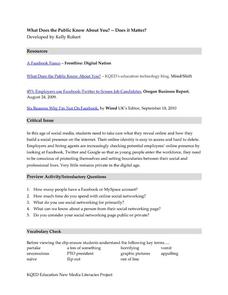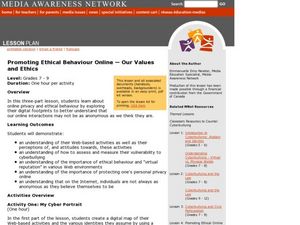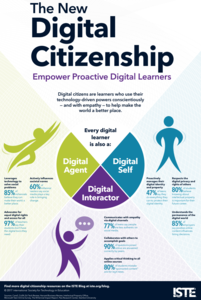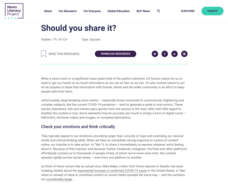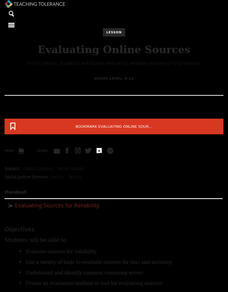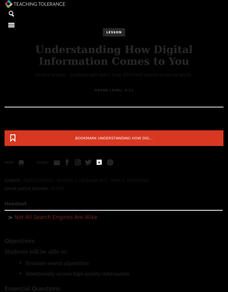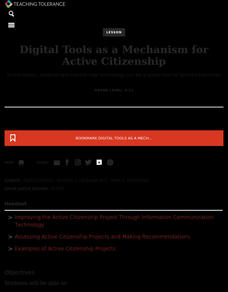Northwest Career & Technical Academy Foundation
Stand Up. . . Be InCtrl!
What is the difference between a bystander and an upstander? A collaborative project created through digital media helps the class understand that they can participate in an online community respectfully and responsibly. They consider...
Facebook
Who Do You Want to Be?
Can posting art or music online lead to the career of your dreams? Inquisitive individuals consider their social media presence with a lesson from a series focusing on identity exploration and digital citizenship. Pairs put their heads...
Royal Conservatory of Music
The Anti-bullying Magazine
Get the word out about friendship, support, and a safe school community with a media literacy lesson about bullying. Young journalists investigate instances of bullying and take descriptive pictures as they compile a magazine to fight...
Teaching Tolerance
News Consumers' Bill of Rights and Responsibilities
Believe it or not, people have rights as new consumers. Scholars read PEN America's News Consumers' Bill of Rights and Responsibilities and work in small groups to paraphrase chosen sections of the text. Next, they create and present...
Curated OER
What Does the Public Know About You? --Does it Matter?
Young people today have to be very careful with how they present themselves online. Show them the possible impact of their online activity and what employers might see when performing a basic search. The lesson provides a video clip...
Common Sense Media
Oversharing: Think Before You Post
Could your learners use a little more discretion when they post online? Take a look at these ten rules of posting etiquette, which prompts them to be smart about what photos and information they share on the Internet.
Google
Online Safety Roadshow Activity
What does it mean to have digital citizenship? A set of lessons teach middle schoolers how to be safe and productive online. From sharing posts to creating secure passwords, learners discuss the importance of remaining diligent—and...
Family Online Safety Institute
Digital Citizenship Flashcard Deck
Being responsible online, leaving a digital footprint, and knowing how to be Internet safe are all important aspects of digital citizenship. Use a set of flash cards that promote conversations among the classroom and instill awareness of...
Southern Poverty Law Center
Evaluating Reliable Sources
A lesson plan instills the importance of locating reliable sources. Scholars are challenged to locate digital sources, analyze their reliability, search for any bias, and identify frequently found problems that make a source unusable.
Curated OER
Vocabulary Building Through Visualization of Word Meanings to Create Digital Art
Use online dictionaries to define vocabulary words and create a visualization of word meanings through digital art. Middle schoolers go online to define assigned vocabulary words. They visualize the meanings of the words in photo...
Common Sense Media
All Digital Citizens Poster
What do digital citizens do? Make sure your kids are using their heads, hearts, guts, and even their feet to be excellent digital citizens! The poster includes an image of a child with certain body parts highlighted. These body parts are...
Curated Video
Policy - The Community Guidelines
Following a site's community guidelines is just one step toward being an excellent digital citizen. After a brief introductory video, small groups come up with their own community guidelines and present their ideas to come up with a...
Curated OER
Promoting Ethical Behaviour Online — Our Values and Ethics
Students explore Internet safety practices. In this online privacy lesson, students examine their digital footprints in order to assess their online privacy and ethics.
ISTE
The New Digital Citizenship
Boost digital citizenship with an engaging infographic that promotes the importance of being a positive digital agent, self, and interactor.
Facebook
Different Perspectives
What do people's social media profiles say about them? Explore diverse perspectives and digital citizenship in an activity designed with self-identity in mind. Pupils reflect on their own profiles, then collaborate to examine...
News Literacy Project
Fact-Check It!
Here's a lesson designed to help learners develop their digital verification skills. First, expert groups study specific digital verification skills, and in a jigsaw activity, share what they have learned with classmates. The jigsaw...
Curated OER
Night and Day: A Digital Art Lesson based on Monet's Rouen Cathedral Series
Think about your favorite place ... now, think about what it looks like at different times during the day. How does the change in lighting affect the colors you see? Young artists explore the tools available in digital art software to...
News Literacy Project
Should You Share It?
Sharing isn't always caring. Scholars learn how to reduce the spread of misinformation on the Internet. They take an online quiz of example posts targeted to a specific audience. Using critical thinking skills, they see if they can tell...
Teaching Tolerance
Evaluating Online Sources
Newspapers, television, social media ... how do people get their news? Using the informative resource, scholars locate and verify credible sources of information. Working in small groups, they discuss strategies for evaluating the...
Curated OER
Your Digital Footprint: Leaving a Mark
A digital footprint is the trail of personal information that comes from purchasing online, tagging friends in photos, blogging, and using social media. Kids discuss what information can be tracked, privacy, and what your digital...
Developing a Global Perspective for Educators
The Lorax - Language
First graders identify text features and how they communicate meaning to the reader. For this media literacy instructional activity, learners view the movie The Lorax and discuss how students from another country would respond to this...
Teaching Tolerance
Digital Activism Remixed: Hashtags for Voice, Visibility and Visions of Social Justice
It's time to discover hashtag activism! Using an engaging resource, learners explore viral hashtag campaigns relating to diversity, identity, and justice. Next, they either design their own hashtag campaigns or respond to existing ones.
Teaching Tolerance
Understanding How Digital Information Comes to You
Google, Yahoo!, Bing ... so many choices, so little time! Using the resource, scholars explore how different search engines affect the way they find information. After reading a handout on the topic and engaging in small group...
Teaching Tolerance
Digital Tools as a Mechanism for Active Citizenship
How is technology a useful tool for active citizenship? Pupils assume the role of technology consultants reviewing citizenship projects. Small groups collaborate to make recommendations about how to incorporate technology to improve...
Other popular searches
- Digital Media Technology
- Digital Media Animation
- Digital Media English
- Debate Using Digital Media
- Digital Media Animation Math
- Introduce to Digital Media
- Digital Media Advertisement
- Analog Versus Digital Media






